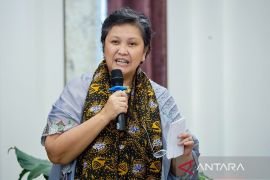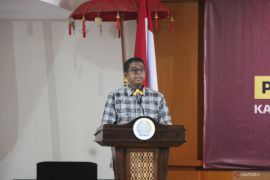"We will meet (the president) to report the results of the supervision of the child protection efforts in 2015 and the priority programs for 2016," KPAI Chairman Asrorun Niam Sholeh stated before meeting the head of state on Tuesday.
Asrorun pointed out that a good trend (in child protection) was observed in 2015. The number of cases of child violence decreased in 2015 compared to that recorded in 2014, thanks to the discourse on the plan to impose a heavier punishment on child crime violators.
At the end of October 2015, he remarked that the president had invited the KPAI to a limited cabinet meeting, which discussed issues and the prevention of child violence.
During the meeting, the KPAI chairman highlighted the need to impose a more stringent punishment on the offenders of child violence, which in nature, would have a deterrent effect to protect children and to prevent offenders from repeating their deeds.
"Hence, the aim was to impose a heavier punishment, and the attorney general at the time proposed a castration punishment. The limited cabinet meeting agreed to reach a decision on the attorney generals proposal," he noted.
He said the results of the meeting became a national issue and were widely reported by the media, which led to a decline in child violation cases.
"The number of child violence cases in October, November, and December has drastically dropped. However, a regulation to this effect had yet to be made despite the fact that the president had emphasized on it during the meeting," he pointed out.
In Tuesdays meeting, Asrorun had promised to seek explanations from the president over the follow-up of the castration punishment plan, which was raised during the limited cabinet meeting last October.
He said the limited cabinet meeting had proposed the issuance of a government regulation in lieu of law (Perppu), which regulates the emasculation punishment against child violence offenders.
"We should use a Perppu since punishment against child violence offenders is urgent as children should be safeguarded," the KPAI chairman affirmed.
He remarked that the victims of child violence were real, and emergency steps were necessary to save them by implementing a radical policy, among others.
"A radical policy, such as a Perppu is needed as a clear and progressive political commitment from the president. What remains to be done is to conduct a follow-up at the operational level by the presidents aides," asserted the KPAI chairman.
Last October, the government had evaluated the possibility of imposing castration punishment on child sex abusers.
"We are studying the legal aspect of imposing castration punishment on child rapists before we decide to issue a regulation on it," Minister of Law and Human Rights Yasonna Laoly stated after attending the opening of the ASEAN Law Ministers Meeting (ALAWMM) in Bali in last October.
The punishment can be awarded through various approaches to reduce the libido of offenders, such as through libido neurosurgery and injections. Castration does not necessarily mean the removal of the offenders testicles.
Social Affairs Minister Khofifah Indar Parawansa stated that the discourse on the imposition of a gelding punishment through a libido neurosurgery surfaced as part of the efforts to protect children from sexual abuse.
"If castration is considered to be a violation of human rights, then what about the rights of the children and their parents after they have become the victims of sexual crimes. What about sexually abused and addicted children?" the social affairs minister questioned.(*)
Editor: Heru Purwanto
Copyright © ANTARA 2016











